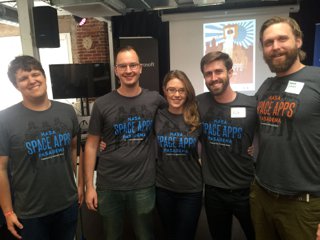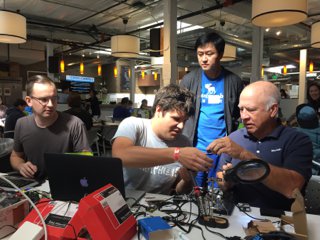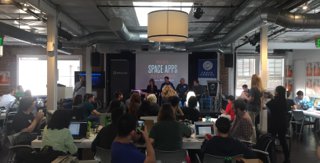On Choosing the Best-Fit Challenge and Forming an Unstoppable Team: Scintilla’s Secret Recipe!
 At the Space Apps 2016 Pasadena Mainstage last year, the Scintilla team won three awards, and as finalists, they went on to win NASA’s Global Best Use of Data Award. With a collection of accolades like these, they must have had the winning recipe for forming the perfect team and choosing the best-fit challenge, right?
At the Space Apps 2016 Pasadena Mainstage last year, the Scintilla team won three awards, and as finalists, they went on to win NASA’s Global Best Use of Data Award. With a collection of accolades like these, they must have had the winning recipe for forming the perfect team and choosing the best-fit challenge, right?
We asked the team of five friends, who have known each other since high school, to share what it really took to take Scintilla as far as they did during Space Apps 2016.
The Scintilla team’s journey began in January 2016, when Chelsea Graf— an aerospace engineer working for Intel on augmented reality— reached out to four “likeminded” friends to see if they wanted to join a hackathon together. “We took a few days, looking at the challenges from previous years, and decided we wanted to be a team before the competition,” says Eric Gustafson, a PhD student studying computer security at UC Santa Barbara.
The five came from different backgrounds, including four programmers— two hobbyists, and two professionals— and they established their roles for the hackathon before the big weekend.
Chelsea, who also has an MBA, was the project manager. “You don’t have to be a coder to do Space Apps,” Chelsea emphasizes. “I was still able to feel like I added a lot of value.” Her teammates agreed. “When we had tunnel vision, Chelsea pulled us out,” says Kyle Spitznagel, who does digital 3D modeling to fabricate pieces of buildings.
You don’t have to be a coder to do Space Apps. I was still able to feel like I added a lot of value.Chelsea Graf, Scintilla project manager
When time came to pick a challenge, the team had aparticularly creative approach! Afternarrowing down to challenges in the Earth category— incidentally, the mostpopular category of Space Apps 2016— the team members put the challenges to a vote.“We put them all in a spreadsheet, and we each took turns labeling themmild, medium, or spicy!” says Chris Del Guercio, who specializes in webdevelopment.

Once the team had identified all the “spicy” ones, they used their skill set and backgrounds to select the best-fit challenge, “Aircheck: Develop an app or platform to crowd-source information for comparing changes in environmental factors, such as temperature, relative humidity, [and] air pollution, with occurrence of symptoms of allergies and respiratory diseases. ”
We put [the challenges] in a spreadsheet, and we each took turns labeling them mild, medium, or spicy!Chris Del Guercio, web developer
At the Space Apps Pasadena hackathon, the team focused on developing the Scintilla system, which collects and relays real-time, local information about air pollution to users. “The competition was a lot of fun,” says Chris. “Our favorite part was the cool vibe that happens when everyone is in the same room.”

The group took Space App’s collaborative problem-solving mantra to heart, and during the weekend, interacted with other Space Apps participants who were working on the same challenge at other locations! “That was one of the really neat things during the competition— we started trying to tweet to the other groups to see what they thought,” says Eric. “Argentina… India… Australia…. They were all working on air sensor data, and they were all tweeting at each other and trying to help out to make more data. We were even getting tweets in Spanish— that was great!”
The new chat platform on spaceappschallenge.org should make this kind of collaboration even easier this year!
The Scintilla team identifies one final key ingredient to their success— making sure to include team members with good communication skills! “It’s critical to communicate… both within the hackathon and outside of it, at work.”
Playing the role of communicator for Scintilla was Chelsea, who helped craft the team’s message for their presentation. “Making the project is one thing, and how you present it is a whole other half of it,” Kyle says. “It was critical to be able to explain what we were doing, which was evolving a new twist every few hours.” Ensuring that they kept messaging in mind throughout the competition allowed the team to successfully present their work after the 48-hour haul, even though they were “kind of groggy” from the intense push to finish.
Making the project is one thing, and how you present it is a whole other half of it!Kyle Spitznagel
The Scintilla team walked out of Space Apps 2017 with two local awards— the Azure award for the Best Use of Data and the Intel-sponsored Best Use of Hardware. They were also the People’s Choice nominee to compete at the global level, where they ultimately were given the Global Best use of Data Award by a panel of NASA judges.
 As we’ve seen with our other Space Apps winners, the team’s story didn’t end at Space Apps weekend! After the hackathon, the group became affiliated with one of the Pasadena Space Apps sponsors, Supplyframe, who gave them a stipend to fully develop a working prototype. “Supplyframe opened a maker space in Pasadena, where they have residents they take on to work there, instead of people paying to work there,” says Chris. He and teammate Konrad Ludwig, a retired army sergeant and author, worked for four months to turn the Scintilla prototype into something real— an Internet of things air quality sensor.
As we’ve seen with our other Space Apps winners, the team’s story didn’t end at Space Apps weekend! After the hackathon, the group became affiliated with one of the Pasadena Space Apps sponsors, Supplyframe, who gave them a stipend to fully develop a working prototype. “Supplyframe opened a maker space in Pasadena, where they have residents they take on to work there, instead of people paying to work there,” says Chris. He and teammate Konrad Ludwig, a retired army sergeant and author, worked for four months to turn the Scintilla prototype into something real— an Internet of things air quality sensor.
At the maker space, Konrad and Chris learned techniques to create an alpha prototype with a professionally designed electronic board and enclosure that would be able to be run in multi-thousands of units. “Space Apps really brought into focus working with hardware,” says Eric. “For me it was really important because I‘m an academic, doing research that has taken a turn to be very hardware involved. The competition brought up a lot of interesting research questions, even though my research has nothing to do with air quality.”
They’ve decided maybe to return to the sensor later.
We asked our final question: Are you returning to Space Apps in 2017? “We’re offering to coach instead of competing in Space Apps this year,” they explained. And as good coaches do, they gave us some parting words of wisdom for the big competition this weekend: “We were lucky,” says Chelsea. “We already knew each other, but you definitely don’t need to. Also, don’t just dive in and pick a challenge. Sit down and learn about your group at first!”
We already knew each other, but you definitely don’t need to. Also, don’t just dive in and pick a challenge. Sit down and learn about your group at first!Chelsea Graf
Some wise ideas to think about as we all await the start of the Data Bootcamps at the New York City and Silicon Valley Mainstages tomorrow!